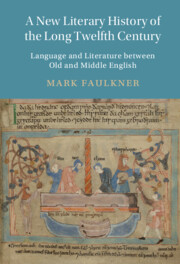 A New Literary History of the Long Twelfth Century
A New Literary History of the Long Twelfth Century Book contents
- A New Literary History of the Long Twelfth Century
- Cambridge Studies in Medieval Literature
- A New Literary History of the Long Twelfth Century
- Copyright page
- Dedication
- Contents
- Figures
- Acknowledgements
- Conventions Used
- Abbreviations
- Part I Preliminaries
- Part II The Affordances of English
- Chapter 3 English in the Linguistic Ecology of the Long Twelfth Century
- Chapter 4 English as a Language of Documentary Record
- Chapter 5 English as a Language for Writing History
- Chapter 6 English as a Language for Sermon Writing
- Chapter 7 Conclusion
- Bibliography
- Index
- Cambridge Studies in Medieval Literature
Chapter 3 - English in the Linguistic Ecology of the Long Twelfth Century
from Part II - The Affordances of English
Published online by Cambridge University Press: 14 July 2022
- A New Literary History of the Long Twelfth Century
- Cambridge Studies in Medieval Literature
- A New Literary History of the Long Twelfth Century
- Copyright page
- Dedication
- Contents
- Figures
- Acknowledgements
- Conventions Used
- Abbreviations
- Part I Preliminaries
- Part II The Affordances of English
- Chapter 3 English in the Linguistic Ecology of the Long Twelfth Century
- Chapter 4 English as a Language of Documentary Record
- Chapter 5 English as a Language for Writing History
- Chapter 6 English as a Language for Sermon Writing
- Chapter 7 Conclusion
- Bibliography
- Index
- Cambridge Studies in Medieval Literature
Summary
This chapter offers an analysis of the shifting fortunes of Latin, English and French between the mid eleventh and early thirteenth centuries, through the lens of linguistic ecology, drawing evidence from metalinguistic commentary in narrative sources, surviving texts, prosopography and onomastics and the findings of the linguistic subdiscipline of language contact. It argues for distinguishing between the period between 1066 and 1140, when the relatively high status English had enjoyed before the Norman Conquest reduced primarily at the hands of Latin, from that between 1050 and 1215, when emergence of French as a literary language, coupled with other late-twelfth-century social changes, more significantly diminished English’s importance as a written language. The chapter closes with some reflections on the factors that condition language choice in multilingual societies, rejecting a simple equation of language and identity.
Keywords
- Type
- Chapter
- Information
- A New Literary History of the Long Twelfth CenturyLanguage and Literature between Old and Middle English, pp. 67 - 101Publisher: Cambridge University PressPrint publication year: 2022
